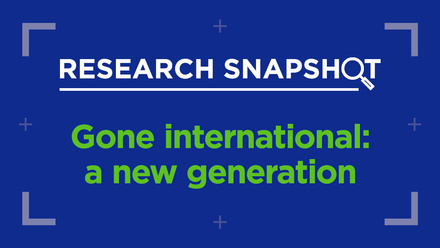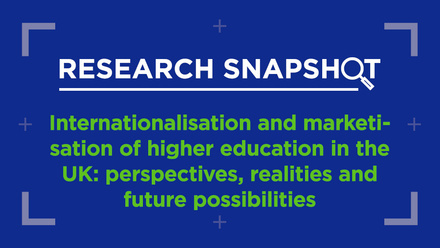International students: Key for the German labour market

In autumn 2022, Germany’s federal government presented its skilled workers strategy. Framed in the context of demographic changes, it assumes a shortfall of 240,000 skilled workers in Germany by 2026. At the same time, it emphasises the potential of international students in terms of recruiting skilled workers: "International students are particularly attractive for the German labour market because they come to Germany with many skills and during their studies gain additional skills which are important for the German labour market."
Every year, over 50,000 international students graduate from higher education in Germany. Their number has almost doubled since 2010. Given the growing shortage of skilled workers in STEM careers, the fact that international students make up a substantial share of students in technical and scientific study programmes is of particular relevance. Over half of international graduates from German higher education institutions gained a degree in a STEM subject, with engineering alone accounting for 40% of international graduates. While the number of German students in STEM courses has been declining for years, the number of international students continues to grow strongly.
Tomorrow’s skilled professionals
However, international graduates only become successful skilled workers when they transition from education to employment. In principle, the foundations for this are good in Germany. Recently, a DAAD survey of over 15,000 international students at German higher education institutions found that almost two-thirds of these students want to stay in Germany after their graduation. Over 80% identified career prospects as one of the leading reasons for choosing Germany as a host country for their studies. Germany also has comparatively generous residence regulations for international graduates, granting them an eighteen-month right of residence to look for a job after graduation.
Still, some major challenges remain: (1) Drop-out rates for international students from Bachelor’s and Master’s programmes remain well above those for German students. Substantially improving study success could significantly boost the potential for international students to stay on as skilled workers in Germany. In absolute terms, this equates to over 25,000 international students dropping out every year. (2) Recent OECD data shows that only a third of international students at German higher education institutions are still in the country ten years after getting their first residence permit and have made the transition to employment or a long-term residence permit.
To address these and other challenges, the DAAD published a position paper titled ‘International students are the skilled professionals of tomorrow’ in March 2023. It looks at the qualification pathway of international students and defines three levers that can and should be pulled in order to double the number of international students entering skilled employment in Germany by 2030: (1) attracting students and preparing them for studies in Germany, (2) improving their study success, and (3) easing their transition into employment. Based on this analysis, the DAAD – together with the Federal Ministry of Education and Research – developed a new funding programme, the ‘Campus Initiative for International Talents’. It is intended to enable German universities to better support international students in their transition to the German labour market. It also aims to identify solutions to existing structural barriers on political, economic and societal levels that might hinder international students from coming, studying, staying and working in the country. Actors from the university, the world of work and communal, regional and federal political and administrative levels need to work together to tackle issues such as university entrance requirements, study preparation, knowledge of the German language, a welcoming culture, career counselling, residence and work permits, housing and many more. The programme will fully start in April 2024.
A fresh start
Already, some German universities have started on a similar path and developed good practices on how to support international students’ integration into the German job market. One example is the iStart career programme for international students at the University of Bonn. Earlier funded by the DAAD and now by the Ministry of Culture and Science of the state of North Rhine-Westphalia, this project aims to support international students with and without a refugee background on their way into the German job market by offering an intensive career programme. During three to four months each semester, 50 participants go through three thematic blocks:
-
Orientation – to get information about job market opportunities, self-analysis of their profiles, and identification of suitable working fields for these profiles
-
Networking – to increase professional contacts among international alumni(ae) who are employed in Germany and with regional companies
-
Application – to learn common rules for analysing job ads, writing tailored applications, and preparing for job interviews and assessment centres.
Each of these blocks contains different types of events, such as workshops, webinars, group coaching, individual coaching, and simulations.
Since the programme applies systemic and participative approaches, the topics, contents and formats of these events may change each semester based on detailed feedback from participants and leaders of this programme. It provides an opportunity for students to decide whether they join the events as participants or take on a leadership role. For the second group, it is possible to receive additional training on leadership skills and accomplish volunteering tasks such as giving feedback and moderating the closing event of the programme. To retain participants´ motivation to stay active until the end of activities, two main incentives are used – offering a certificate and a CV photoshoot after a specific number of visited events.
After six completed semesters, the iStart programme is well-established and well-known among international students at the University of Bonn. Often, former participants, upon graduating from their studies and finding employment, become alumni(ae) speakers for this programme, contributing to its self-sufficient sustainability. During these completed semesters, 273 participants have benefited from the programme. Only five dropouts were registered per semester on average, with a total of 104 participants receiving a certificate for being active (attending more than six events) during the semester. Remarkable is not only the active engagement of programme participants but also the measured impact: the iStart-team is conducting an impact analysis, comparing the employment rate at three different points in time – programme start, end of the programme and three months after that. The data from six semesters shows that the average employment rate increases from 35% to 55% by the end of the programme and up to 70% three months after graduating from the programme.
The iStart team has published a praxis guide in German with a more detailed description of the intensive career programme and the evaluation and analysis conducted in 2022. Next year, a new edition of this guide will be published in English.






